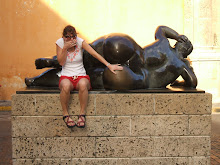As someone who has never had a nickname (in English there’s not much you
can do with Sarah), I have loved that in Colombia I have, not one, but two of them. Like I have always been anywhere
in Latin America, here I am Sarita. But besides
“–ita” also Colombians have “-is” as another diminutive/term of endearment that
they add to the end of people’s names.
So here I am sometimes Saris, and I love it when people call me that
because a) it’s only for people you really like and b) it’s so 100% Colombian.
Those are some of the things you do with people’s names,
but there is also a whole host of other pet names and ways of addressing people
that Colombians use that I think are great.
There are some things that are reserved only for people you know really
well (like family) and others where the line is more blurry. I crack up whenever I hear my friends call
their husbands or children “gordo” or “gorda” (fatty), especially when they are
not at all. I also love it when people
refer to babies or toddlers as “mami” and “papi,” since they are clearly nobody’s
parents. Then there are some of the ways
I have been addressed in stores or at the gym or at the market or by people at
school. Among my favorites are: “mi vida”
(my life), “mi reina” (my queen), “mujer” (woman – I think this is more a thing
from the coast, but the guy at the photocopy place called me it yesterday), and
“profe” (short for profesora (teacher)).
There’s also the expression “sumercé,” which is short for “su merced”
(your mercy) and is a veeeery old fashioned but widely-used way of addressing
someone respectfully. I’ve always
thought it was surprising that the graffiti artists at the Universidad Nacional
use it in some of their calls to arms, though I guess it does rhyme with “rebelarse”
(to rebel), which is how it usually
appears.

No comments:
Post a Comment